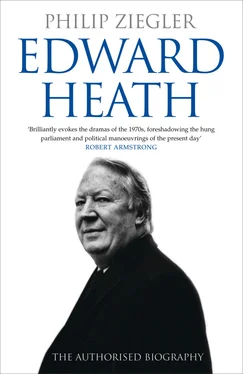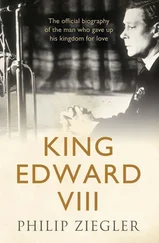He knew that such speculation was largely academic. Political activity would be at a low ebb until the end of the war and, anyway, he expected that he would quickly be called up and would have many more immediate preoccupations. His younger brother, John, was already with the infantry in France, yet Heath was kept hanging about. ‘I’m horribly bored,’ he told a Balliol friend some time in the early summer of 1940.
I’ve been waiting now since February…without anything really to do. Each time I’ve heard from them or pressed them I’ve been told I should be wanted in only a couple of weeks, with the result that it was impossible for me to get a temporary job to pass the time. I was called up once actually for the Buffs [John’s regiment] but two days before I had to report I received another notice saying ‘owing to unforeseen circumstances’ my calling-up notice was cancelled…I’m rather anxious to get in and get on with it…There is so much to do and, as ever, so little time to do it. What a struggle it will have to be, but what a magnificent opportunity. 9
From Balliol, Lindsay had promised to do what he could to get Heath into military Intelligence, but either his attempt aborted or he forgot about it. When Heath finally came before the Board he found that he had been assigned to the Royal Artillery. He had every hope that he would be commissioned as an officer within a few months, but the basic training that had to be undergone by every gunner lay ahead of him. ‘I don’t think I regret what’s coming,’ he told his diary resignedly. ‘It may well be for the best.’ There would be hardships, of course: uncomfortable clothes, lack of privacy, gruelling hard work, difficult hours, ‘bad food served absolutely revoltingly’, but there would be good things too: fitness, discipline, relief from responsibility for a while. Living cheek-by-jowl with ‘people of whom he knew nothing, unintelligent people, uneducated people, unstimulating and unstimulatable’, was the thing that frightened him most. Yet he recognised that ‘if I could feel at the end that I knew them and what they expected from life it would be a good thing’. He prayed that there would be at least a few men ‘reasonably like people I’m accustomed to’; but at the same time he told himself that he should welcome the chance to escape from his background and the class with which he had been assimilated: ‘I have a desire, perhaps when analysed not very rational or even sane, to get “hard” like other men; to take the knocks they can take, to go wining and whoring with them. Yet whenever I meet them I feel repelled by their lack of intelligence and concern only with things like pay, leave and food. Perhaps my nature’s different.’ 10
When the call-up did eventually come in August 1940 Heath found that his nature was not so very different after all, or at least that physical exhaustion and a common resentment of the iniquities of the lance-bombardier in charge of his barrack room produced a sense of camaraderie and mutual tolerance among the recruits. By good fortune he found a fellow music-lover, a future director of the New York City Ballet, among the other novice gunners at the training camp near Storrington in Sussex; still more remarkably they found that the composer Sir Arnold Bax was a habitué of the local pub. Even without such resources, however, Heath would have found life at Storrington tolerable, almost enjoyable. It was comforting for him to know where he stood in relation to other people, exactly where his duties began and ended. He could not have endured for long his lowly status, the total absence of responsibility, but for the three months of basic training it suited him very well. Given his record, he would have had to do something badly wrong not to be selected for a commission; he made no such blunder and was duly sent as an officer cadet to Shrivenham in Wiltshire. His training there was as straightforward and as uneventful as at Storrington. In March 1941 he was commissioned into the Royal Artillery and posted to a Heavy Anti-Aircraft Regiment at Chester. For the next three years and two months he shuttled around the United Kingdom, occasionally helping defend Britain’s cities against air attack, more often sitting around waiting for something to happen.
What quickly became evident was that Heath was a good soldier. Whether he had the qualities necessary for success at the highest level was never to be tested, but as a regimental officer he showed himself impressively calm, clear-headed, resolute and with marked organisational skills. One of his few faults, indeed, was a tendency to over-organise. When his battery was to move from the north prior to embarkation for France, for instance, he worked out every detail, even down to the seats the individual men would occupy, and produced a set of instructions so comprehensive that nobody could be bothered to read, let alone implement them. The results, as he ruefully admitted, were ‘completely catastrophic’. 11On this occasion he recognised his failing and resolved to correct it. But he never altogether conquered his conviction that every eventuality had to be prepared for, every problem foreseen. Time and again he was to be disappointed when things did not turn out as he had expected; each time it came as a disagreeable surprise.
At his level at least it was a fault generally on the right side: better too much organisation than too little or none at all. Successive commanding officers paid tribute to his talents. ‘I consider E. R. G. Heath to be the most capable officer I met in any department during the four years in which I had command,’ wrote Major Tyrell, when recommending Heath for a military MBE. ‘He had personality, drive and ability of the highest order. He was quick to grasp essentials and to formulate plans and his determination, energy and enthusiasm guarantee that they shall not miscarry. I find it difficult to present a fair picture of a man in whom I could detect no weakness of character, whose intellectual scope and integrity I could but admire and for whom I feel nothing but respect and affection.’ Colonel Chadd, who was to become a lifelong friend and make Heath godfather to his son, was equally complimentary. ‘At his interview,’ Chadd wrote, Heath told him that after the war, ‘he hoped to go into politics. Within a very short space of time Ted was held in the highest possible esteem by all of us – officers and other ranks alike – and we were quite sure that one day he could be prime minister.’ (Given that this was written in 1946 the officers and other ranks in question were remarkably perceptive.) 12
Not everyone was so ecstatic. Tony Race, his site commander when he was posted near Liverpool, found him ‘mature and confident’ and admired his ‘stamina and efficiency’, but felt him to be ‘a little withdrawn. He hadn’t a warm personality.’ But even this accusation – which was to become all too familiar over the years – was denied by his admirers. ‘The men liked him,’ claimed Chadd. ‘He was never impatient with dullards or arrogant to people not so bright as himself.’ When he took over a battery from a major who had commanded it for several years, he was viewed with some suspicion. ‘We were none too happy,’ remembered the orderly room sergeant, James Hyde:
Up to then he had been an administrator. He hadn’t done any fighting worth speaking of…But I think it’s right to say that within a fortnight or three weeks he exercised such a persuading influence…that one found Heath was first class. So far as administration was concerned, he was perfect. The other reason he was first class – and this was to my surprise – was that he rapidly understood the men and their reactions…Within a month or two it was Heath’s battery. The men liked him because they thought he was a fair man. 13
Читать дальше












